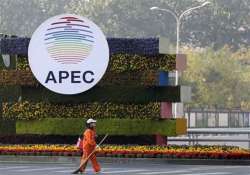For summit, China orders up a quiet, clean Beijing
Beijing: A thousand new facial-recognition cameras are watching for potential troublemakers. Kite-flying has become a jailable offense in some areas.Factories have been ordered to cut back or suspend production. And those are just part of

Beijing: A thousand new facial-recognition cameras are watching for potential troublemakers. Kite-flying has become a jailable offense in some areas.
Factories have been ordered to cut back or suspend production. And those are just part of China's efforts to clear Beijing of dangers, dissent and smog during an international summit deemed the capital's biggest event since the 2008 Olympics.
Ahead of the Asia-Pacific Economic Cooperation (APEC) forum that opened on Wednesday, city crews also have replaced 450,000 flower pots, swept newsstands and breakfast kiosks from some neighborhoods and encouraged—or warned—many residents, and especially dissidents, to leave town.
Government workers get a long holiday, and authorities eager to ease congestion are taking the unusual measure of deploying cargo trains to carry the cars of holidaymakers out of the capital.
Though there will be far fewer visitors to the city than there were during the Olympics, APEC will again throw an international spotlight on China with the arrival of top leaders from the Pacific Rim along with their countries' media.
The forum culminates in a Nov. 10-11 summit of leaders of the 21 member economies, including Chinese President Xi Jinping, U.S. President Barack Obama,
Russian President Vladimir Putin and Japanese Prime Minister Shinzo Abe, and authorities are wary of anything that could draw media attention away from the meetings.
The organizer of a Beijing film festival that authorities shut down in August said police have asked him several times to leave Beijing during APEC.
“The police are at my home every day,” Li Xianting of the Beijing Independent Film Festival said in a telephone interview. He said he didn't plan to leave on principle, and also because he didn't want to bring trouble to anyone he might stay with.
Qi Zhiyong, a rights activist who lost his leg after soldiers fired on him during the Tiananmen protests in 1989, said he was asked to leave Beijing and told not to give media interviews.
A friend of Zhou Li, who helps ordinary citizens submit complaints to the central government about corruption and other grievances, said Zhou was detained around Oct. 21 so she would not organize any protests during APEC. The friend spoke on condition of anonymity because she had been told by police not to talk to the media.